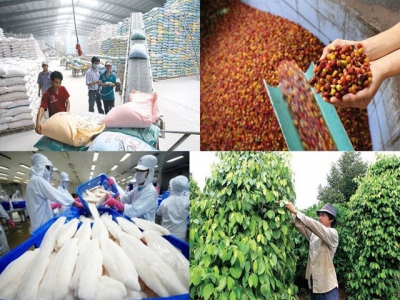EVFTA offers market gap for national agricultural sector

Joining the Vietnam-EU Free Trade Agreement (EVFTA) is set to create favourable conditions for many of Vietnam’s advantageous items, such as agricultural products, to make inroads into the EU market.
Following the EVFTA’s recent ratification by the European Parliament, Vietnam has become the first developing country in the Asia-Pacific region to enjoy free trade relations with the EU.
Many experts believe that the trade pact will ultimately serve to eliminate over 99 per cent of tariff lines, thus creating optimal conditions for the country's advantageous exports, particularly agricultural products, to penetrate the highly lucrative market.
The EVFTA is therefore expected to facilitate the country’s access to the world's leading market in terms of size, technology, and financial potential.
Due to the EU being a market that maintains high standards, both local businesses and the national economy will be forced to strive to reach some of the highest standards in the world in terms of trade and investment in order to gain access to the market.
Moreover, the EVFTA is also expected to allow the country to restructure its import and export activities whilst simultaneously avoiding becoming reliant on traditional markets.
Nguyen Do Anh Tuan, director of the Department of International Cooperation in the Ministry of Agriculture and Rural Development, said the EU represents a huge market that has the world's fourth largest GDP and annually imports agricultural products that reach approximately US$150 billion.
At present, the nation’s agricultural exports rake in over US$40 billion each year globally with exports to the EU making up only US$5 billion of the overall figure.
With the country poised to enjoy immediate tariff cuts right after the EVFTA comes into effect, especially with regard to tariff reduction on agricultural processed products, there will be plenty of opportunities for local goods to enjoy competitive prices whilst exporting to the EU market.
Tuan went on to emphasis that the average income of European citizens remains high, whilst they are also willing to pay a higher price for high-quality products.
This will help to speed up restructuring within the agricultural sector in order to put a greater focus on items with a higher value and quality while ensuring sustainable development for the industry, he noted.
The EU is also one of the most stringent markets when it comes to agricultural products, with a number of strict requirements in place such as on antibiotic residues and pesticides relating to these products. If local businesses are able to meet these conditions, their agricultural products will not only enter the EU but also other markets globally.
Experts stated that there is a need to review overall technical standards and improve the industry’s capacity to meet the requirements set by high-end markets such as the EU.
Vu Tien Loc, Chairman of Vietnam Chamber of Commerce and Industry, assessed that to take advantage of the EVFTA's opportunities, the most important issues are to improve the competitiveness of local goods and accelerate institutional reform.
Loc proposed that government agencies focus on building institutions that aim to facilitate the operation of firms, while businesses should focus on enhancing their own competitiveness, renovating business models, and devising long-term business strategies towards sustainable development.
Có thể bạn quan tâm
 BASF's focused approach boosts agricultural innovation by 25 per cent
BASF's focused approach boosts agricultural innovation by 25 per cent BASF has recently announced an increased projected peak sales potential for its innovation pipeline of agricultural solutions to more than €7.5 billion
 Price of watermelons increases to VND4,000 per kilogram in Quang Ngai Province
Price of watermelons increases to VND4,000 per kilogram in Quang Ngai Province Although the price of watermelons is not high, it is still an advance amid the peak harvest of watermelons.
 Senegal a potential market for Vietnamese rice
Senegal a potential market for Vietnamese rice Việt Nam this year would have opportunities to continue increasing rice exports to Senegal, as well as Africa as a whole, due to high demand from those markets,